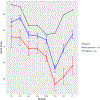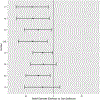Association Between Pediatric Delirium and Quality of Life After Discharge
- PMID: 33031144
- PMCID: PMC8195312
- DOI: 10.1097/CCM.0000000000004661
Association Between Pediatric Delirium and Quality of Life After Discharge
Abstract
Objective: Delirium occurs frequently in critically ill children, with highest rates reported in children under 5 years old. The objective of this study was to measure the residual effect of delirium on quality of life at 1 and 3 months after hospital discharge.
Design: Prospective observational cohort study.
Setting: Urban academic PICU.
Patients: Children younger than five years of age at time of admission to the PICU.
Interventions: All children were screened for delirium (using the Cornell Assessment for Pediatric Delirium) throughout their stay in the PICU. Quality of life was measured using the Infant-Toddler Quality of Life questionnaire at three time points: baseline, 1 month, and 3 months after hospital discharge. Infant-Toddler Quality of Life scores were compared between children who did and did not develop delirium.
Measurements and main results: Two hundred seven children were enrolled. One hundred twenty-two completed the 1-month follow-up, and 117 completed the 3-month follow-up. Fifty-six children (27%) developed delirium during their PICU stay. At follow-up, Infant-Toddler Quality of Life scores for the PICU cohort overall were consistently lower than age-related norms. When analyzed by delirium status, children who had experienced delirium scored lower in every quality of life domain when compared with children who did not experience delirium. Even after controlling for severity of illness, delirious patients demonstrated an average 11-point lower general health score than nondelirious patients (p = 0.029).
Conclusion: This pilot study shows an independent association between delirium and decreased quality of life after hospital discharge in young children.
Figures


Comment in
-
On the Importance of Addressing Pediatric Delirium Phenotypes and Neurocognitive Functioning: Pediatric Critical Illness Brain Injury in COVID Times.Crit Care Med. 2020 Dec;48(12):1911-1913. doi: 10.1097/CCM.0000000000004679. Crit Care Med. 2020. PMID: 33255113 No abstract available.
References
-
- Diagnostic and Statistical Manual of Mental Disorders, 5th Edition. American Psychiatric Association; 2013.
-
- Salluh JIF, Sharshar T, Kress JP. Does this patient have delirium? Intensive Care Med. 2017. May;43(5):693–5. - PubMed
-
- Barr J, Fraser GL, Puntillo K, Ely EW, Gélinas C, Dasta JF, et al. Clinical Practice Guidelines for the Management of Pain, Agitation, and Delirium in Adult Patients in the Intensive Care Unit. Crit Care Med. 2013. January;41(1):278–80. - PubMed
-
- Ouimet S, Kavanagh BP, Gottfried SB, Skrobik Y. Incidence, risk factors and consequences of ICU delirium. Intensive Care Med. 2006. November 11;33(1):66–73. - PubMed
-
- Dubois MJN|Dumont M|Dial S|Skrobik Y. Delirium in an intensive care unit: a study of risk factors. Intensive Care Med. 2001;27(8):1297–304. - PubMed
Publication types
MeSH terms
Grants and funding
LinkOut - more resources
Full Text Sources
Medical

